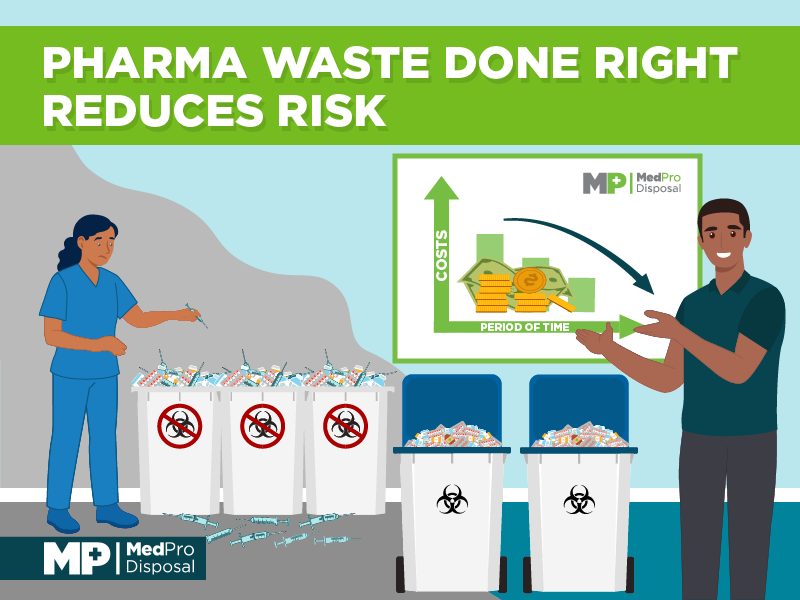Healthcare facilities across the United States face a critical and ongoing challenge. They need to balance pharmaceutical waste management with strict compliance and cost reduction.
Handling expired and controlled medications, even in small batches, needs a precise approach. Learning the best practices you can apply can help reduce your risk and control your costs.
Why Does Pharmaceutical Waste Management Matter?
Effective pharmaceutical waste management matters for three reasons. First, it’s essential for legal compliance. Second, it protects public health, particularly your patients and staff.
Third, it safeguards the environment and your community. Pharmaceutical wastes, including P-listed and U-listed wastes, pose significant risks to public health and the environment.
Are You Managing Your Pharmaceutical Waste Properly?
Pharmaceutical waste management includes:
- Identifying and segregating waste.
- Storing pharmaceutical waste in designated containers.
- Scheduling pickup with certified disposal providers.
- Documenting the entire process for compliance.
But many pharmacies, clinics, and dispensaries don’t follow this process. They struggle with compliance. They lack segregation protocols and proper staff training. Worse, some are not aware of the latest pharmaceutical waste regulations.
The Effects of Mismanaging Your Pharmaceutical Waste
Mismanaging pharmaceutical waste has severe consequences, impacting public health, safety, and your reputation.
The Cost of Non-Compliance
Non-compliance can cost facilities and practices a lot. Mismanagement leads to increased operational costs and logistical headaches.
Violations for improper disposal and destruction can carry severe repercussions. They can even lead to criminal charges and license suspensions. In the long run, non-compliance can hurt reputation and erode patient trust.
Regulatory Penalties
Federal and state agencies impose steep regulatory penalties for non-compliance. The EPA (through RCRA) enforces improper hazardous waste handling. The DEA regulates non-compliance with the Controlled Substances Act. Both agencies impose harsh penalties for mishandling controlled pharmaceutical waste.
State pharmaceutical waste regulations add another layer of compliance. They can enforce stricter regulations and levy stiffer fines for specific state-level violations.
Public Health and Environmental Risks
Improper disposal leads to serious public health and environmental risks. If disposed of in landfills, they can leach into the groundwater and soil. Flushing medications down drains introduces active pharmaceutical ingredients into water treatment systems.
These systems can’t eradicate pharmaceuticals completely. That creates serious concerns for aquatic life and human consumption. Mixing hazardous pharmaceutical waste with general waste poses public health risks. Your pharmacy and clinic staff, and the public, are in danger of accidental exposure.
Best Practices for Proper Pharmaceutical Waste Management
Proper pharmaceutical waste management uses best industry practices to reduce risk and cost.

| Best Practice | Risk Reduction Benefit | Cost Reduction Benefit |
| Segregation & Labelling | Prevents cross-contamination and exposure to hazardous pharmaceutical waste. | Reduces hazardous pharmaceutical waste volume. |
| Mail-Back Pharmaceutical Waste Disposal Programs | Prevents misuse of expired medication, drug diversion (theft), and environmental contamination. | Centralizes waste collection and disposal and lowers costs. |
| Extended Producer Responsibility (EPR) Programs | Returns ensure safe disposal and compliance. | Shifts the cost of disposal to producers or manufacturers. |
| Waste Minimization | Lessens the unused and/or expired drugs or medications in stock. | Lowers procurement and disposal costs. |
| Staff Training | Reduces accidents and errors and improves regulatory compliance. | Minimizes costly errors, potential exposure, and accidents. |
| Awareness Campaigns (for staff, patients, and customers) | Increases knowledge of safe disposal levels and practices. | Reduces cost due to improper disposal. |
Regulation-Compliant Ways to Manage Pharmaceutical Waste
Proper Waste Segregation: Avoiding Costly Mix-Ups
Effective waste segregation is the cornerstone of pharmaceutical waste management. It prevents cross-contamination and simplifies the disposal process.
- Label and segregate pharmaceutical waste. That includes expired medications, P-listed and U-listed wastes, non-hazardous pharmaceutical waste, and sharps.
- Use marked, secure, and appropriate containers for each waste stream. Store them away from public access. Clean, disinfect, or replace them if damaged.
- Avoid mixing waste streams at all costs. Mixing complicates the disposal process. It escalates costs and increases compliance risks.
- Federal and state agencies set rules for pharmaceutical waste disposal. State regulations are often stricter than federal ones. Some states also require extra permits and tracking forms for certain disposal methods.
Cost-Efficient Methods to Manage Your Pharmaceutical Waste
Managing pharmaceutical waste effectively involves two key areas. Efficient internal waste reduction strategies and smart external disposal solutions.
Minimize Waste Generation at the Source
Reducing the volume of waste you generate lessens your disposal costs.
- Implement a “first in, first out” (FIFO) system for strict inventory control. A FIFO system includes dispensing older medications before they expire.
- Use accurate dispensing and single-dose packaging. Dispense only what each patient requires for treatment. Single-dose packaging helps reduce waste from partially used or leftover medication.
Leverage Cost-Effective Disposal Methods and Services
The proper disposal methods yield substantial savings and ensure regulatory compliance.
- Explore reverse distribution programs. Inquire if your manufacturers will take back unused or expired medications, for credit or disposal.
- Use mail-back waste disposal programs. They offer a convenient waste disposal and cost solution, especially for retail pharmacies and small facilities in remote areas.
- Sign with a reputable pharmaceutical waste disposal provider. Choose a provider who offers comprehensive pharmaceutical waste management services.
- Consider sustainable waste management practices. A reliable provider knows about environmentally responsible disposal methods and how these can help reduce costs.
Strategies for Safer Pharmaceutical Waste Management
Beyond cost, safety and compliance always remain paramount.
- Provide regular and comprehensive staff training. Compliance training covers proper waste segregation, handling, storage, and emergency protocols.
- Conduct self-audits and inspections regularly. These are proactive steps to identify and correct potential compliance gaps and avoid costly violation penalties.
- Teach patients how to safely dispose of unused medications. Encouraging returns helps reduce pharmaceutical waste and builds a more responsible community.
Why the Right Pharmaceutical Waste Disposal Company is Essential
Choosing the right pharmaceutical waste disposal company simplifies compliance and protects your facility. And MedPro has you covered. We serve over 40,000 clients in 48 states by combining our nationwide reach with highly personalized service.
We operate with a “Customer First” mentality. We offer top-notch support, predictable pricing, and flexible solutions, which include mail-back waste disposal programs. MedPro helps simplify your pharmaceutical waste management. Then, you can focus on what you do best: provide precise prescriptions, medication dispensation, and patient care.
Ready to reduce risk and cost
with the right pharmaceutical waste disposal company? Call MedPro Disposal for Your Quick Quote Today: 888-641-6131







